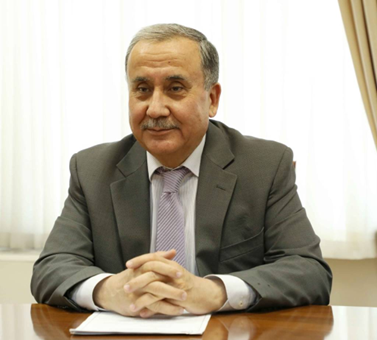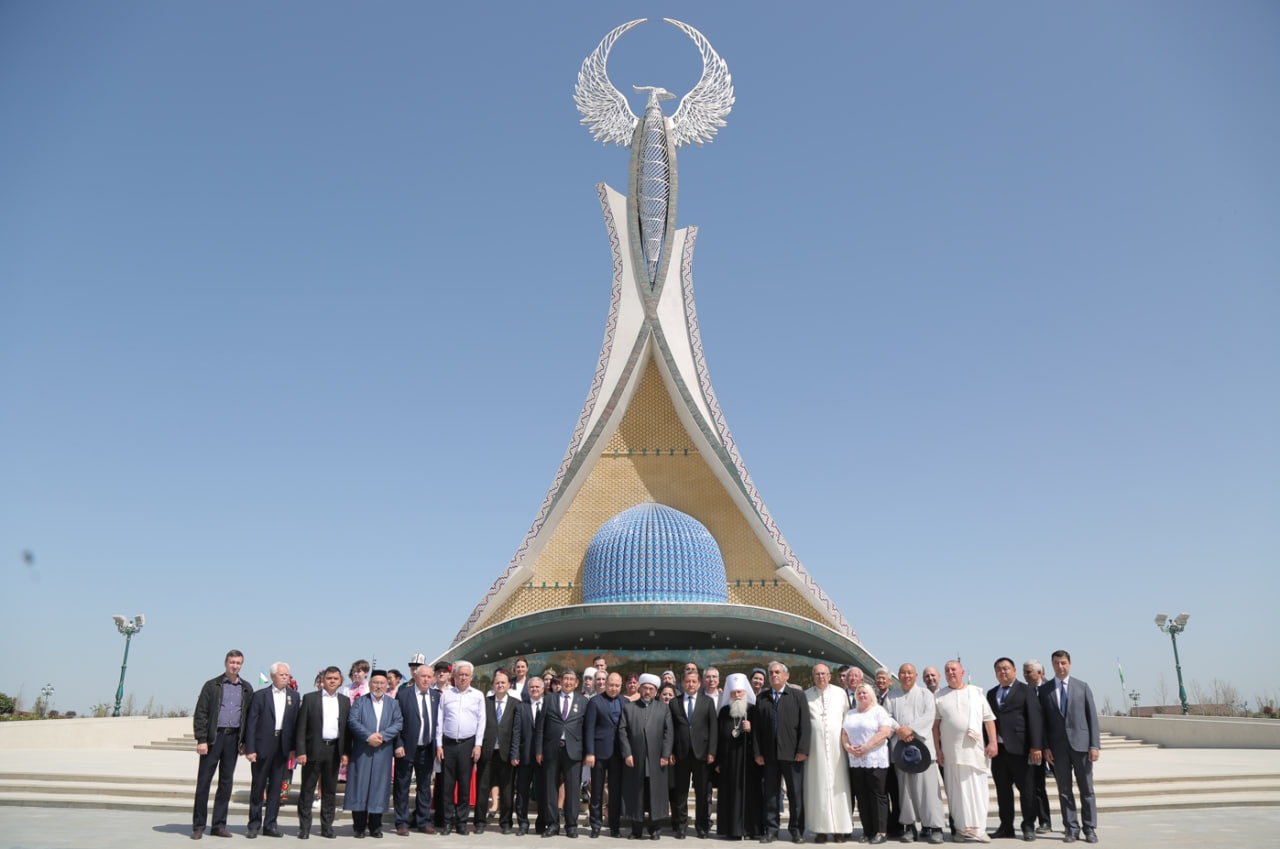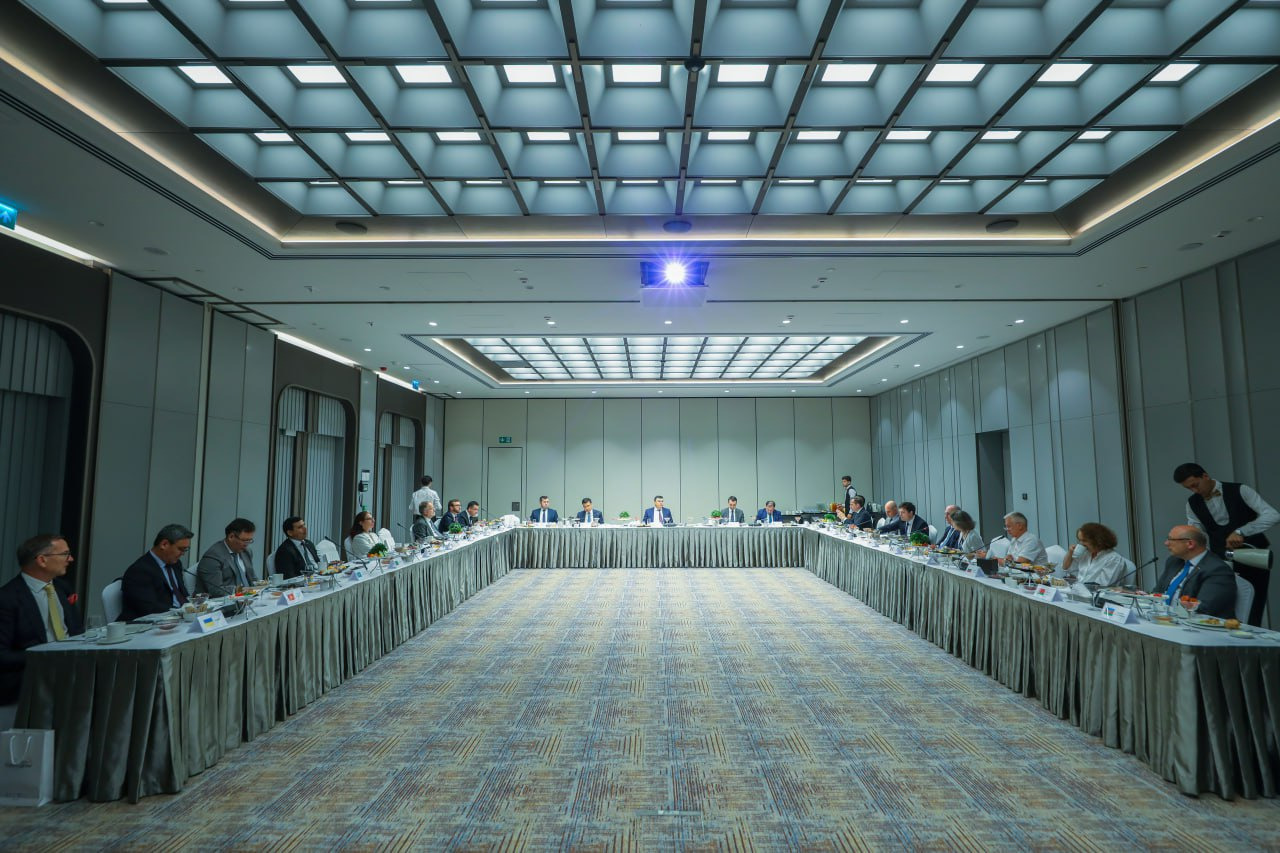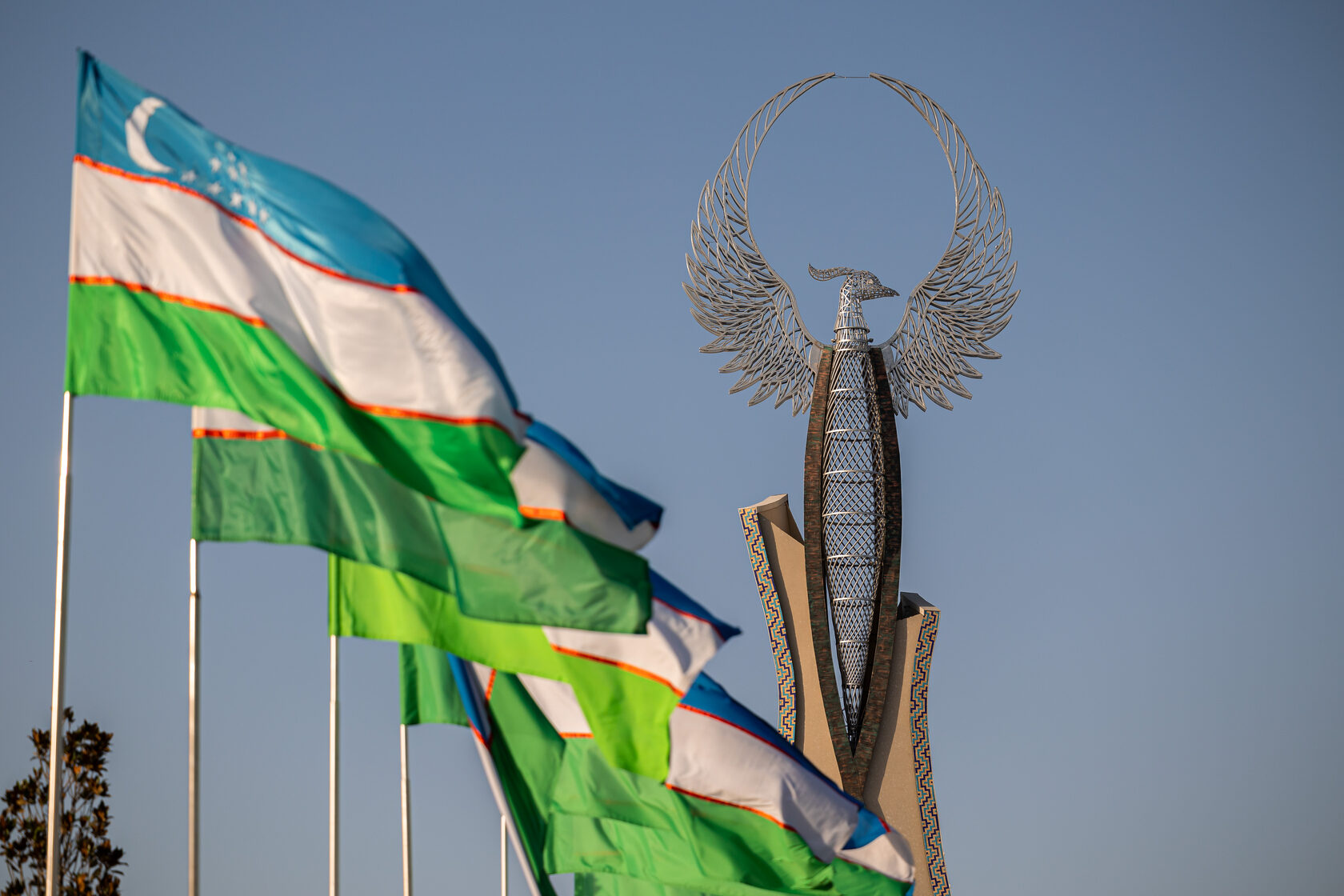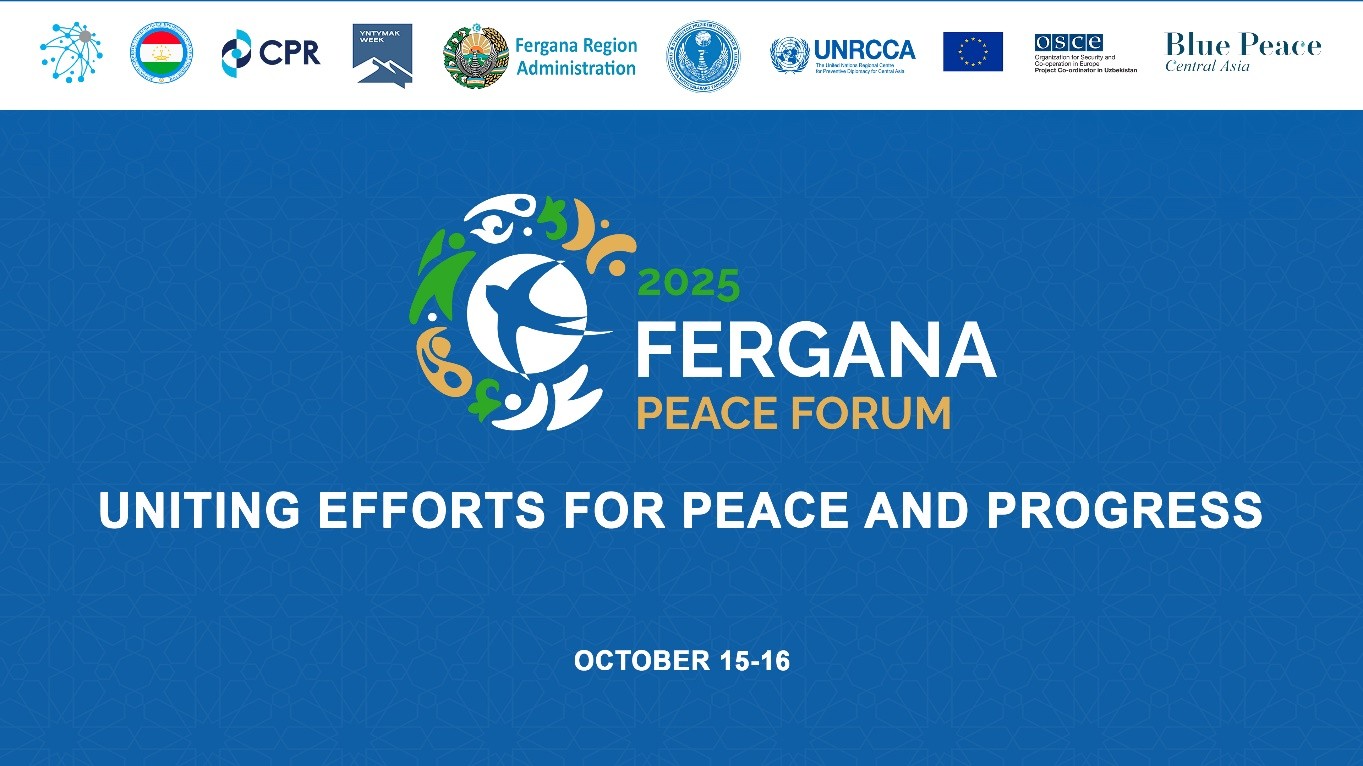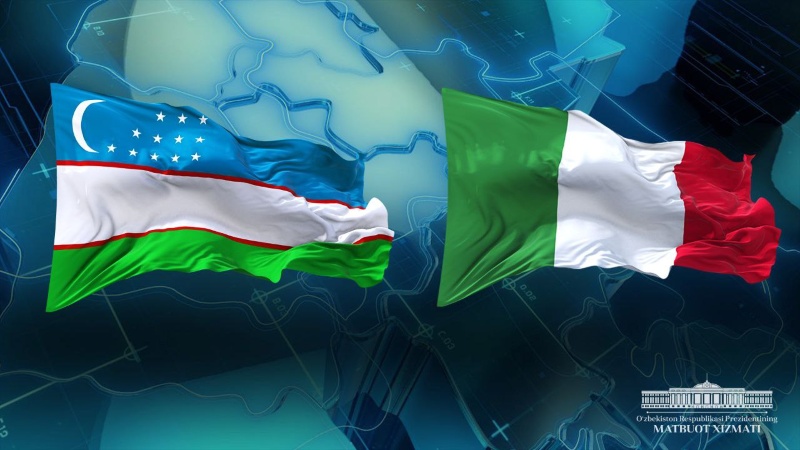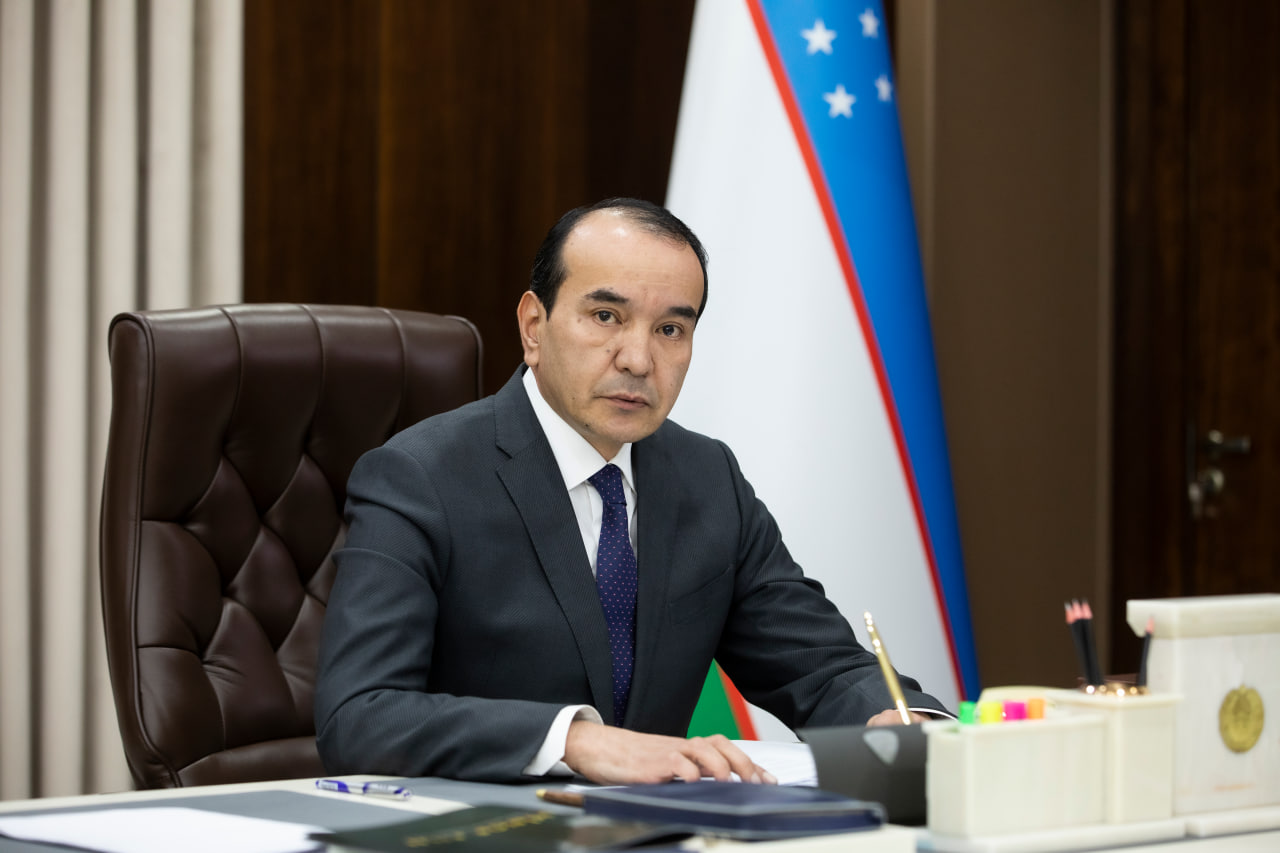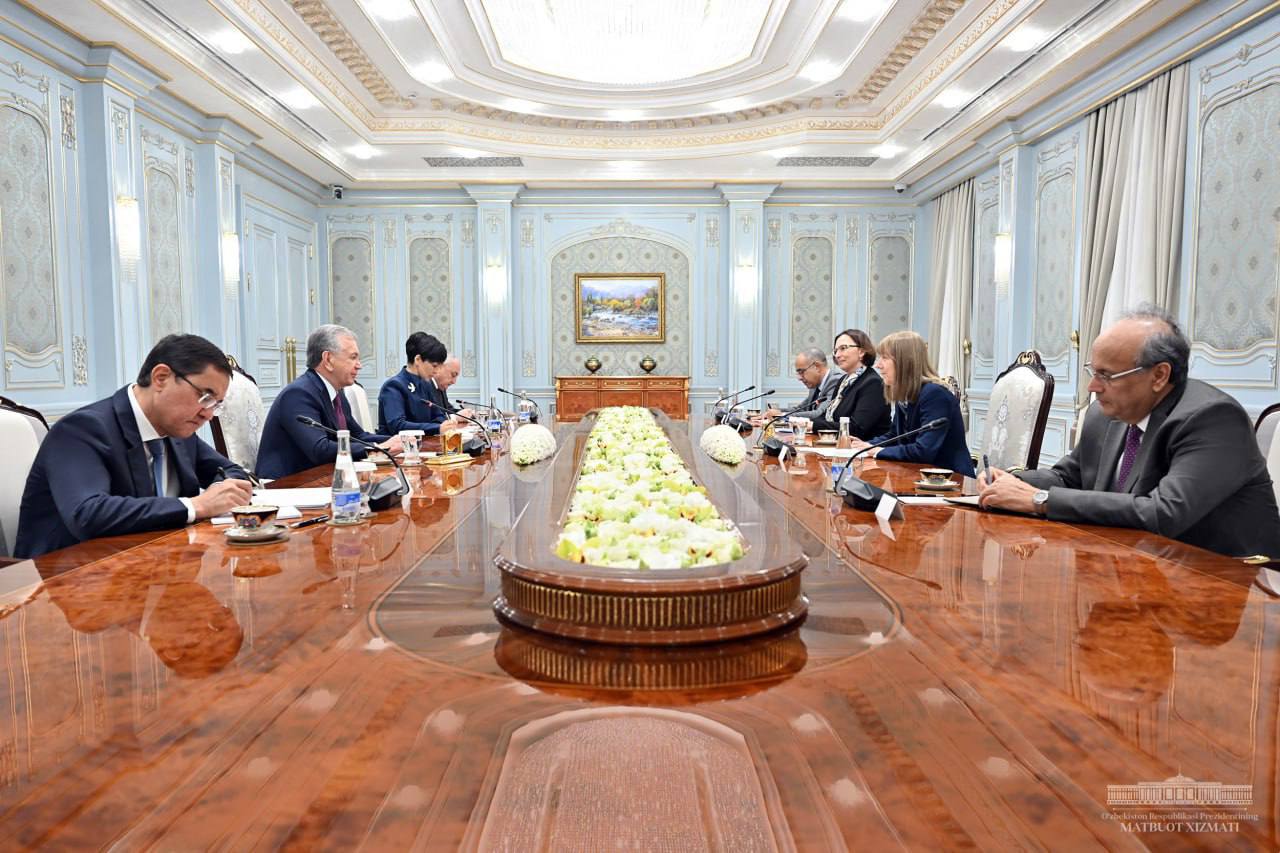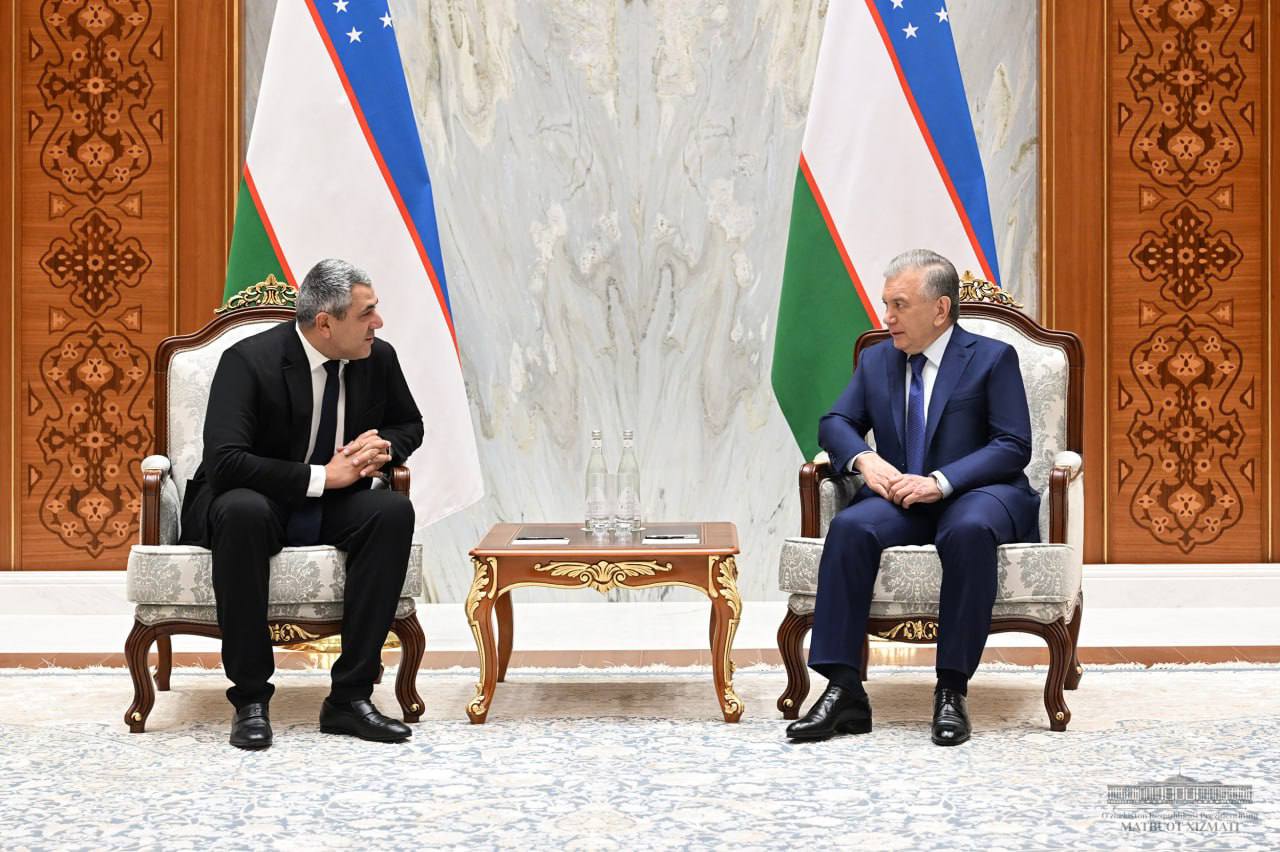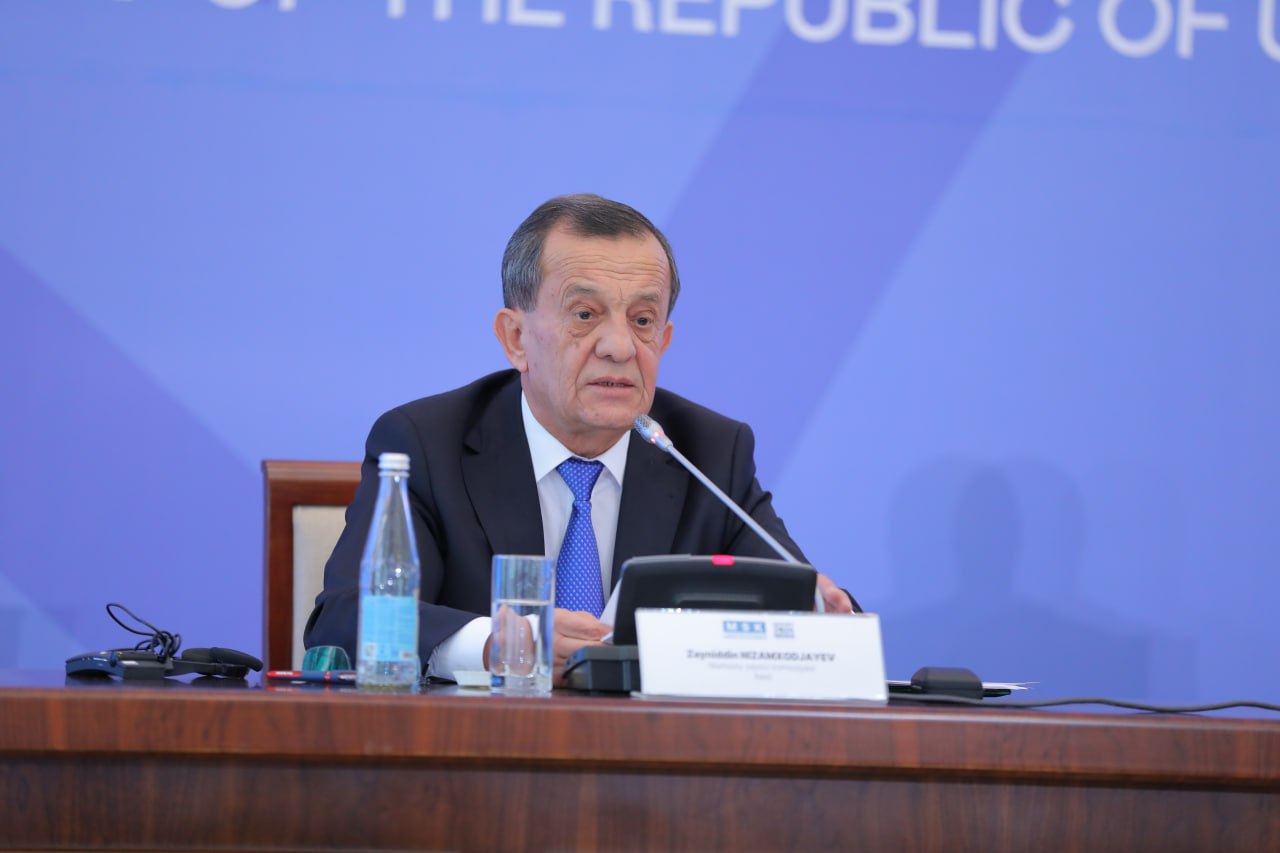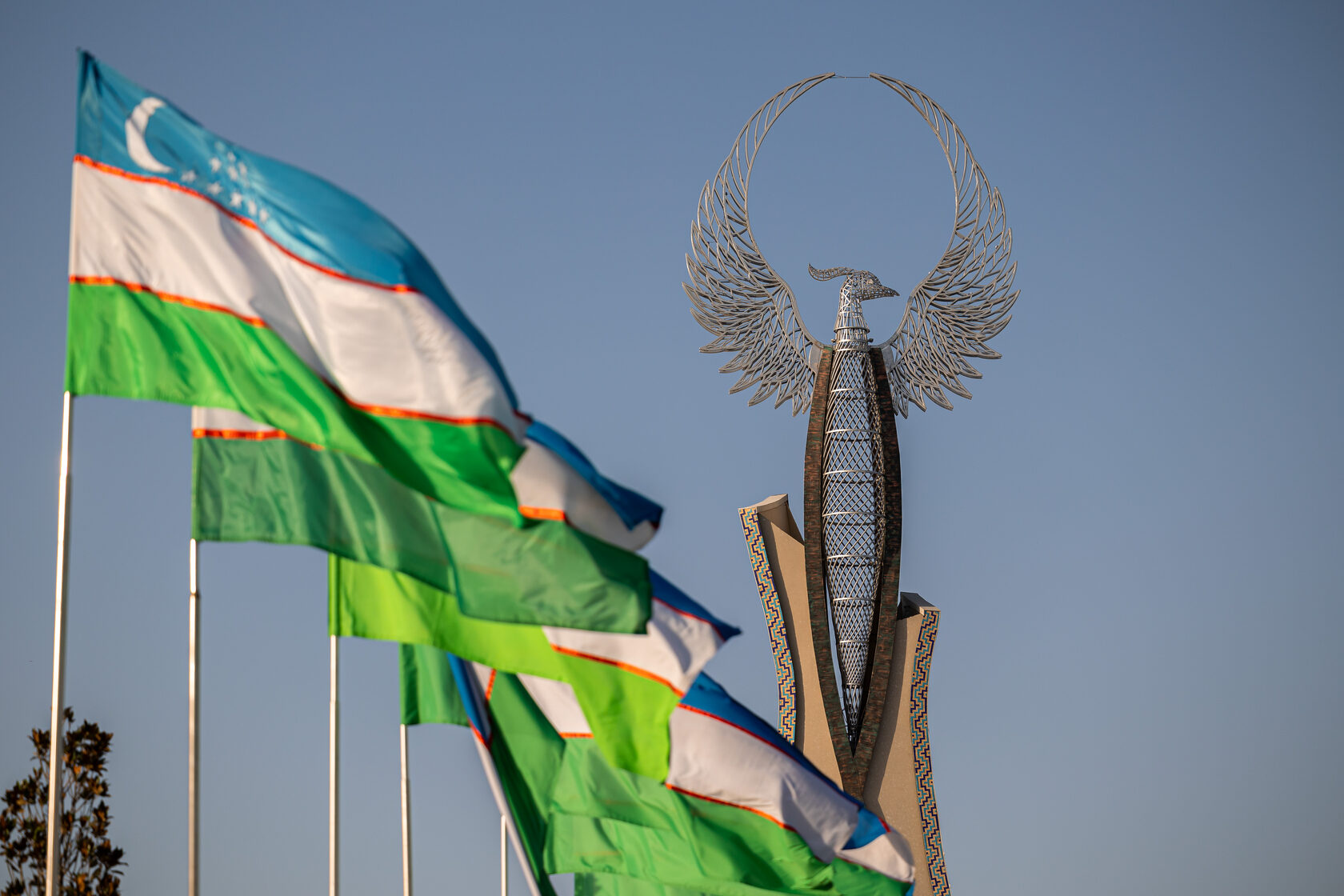Phone
Consular Issues
Phone
Uzbekistan news
We recommend
Uzbekistan’s Priorities in the Organization of Turkic States: A Factor Ensuring Sustainable Development of Turkic Countries
📅 08.10.2025
The evolution of the Organization of Turkic States (OTS) has attracted particular attention from the international expert community, especially in the context of sustainable development, where Uzbekistan’s accession in 2019 became a catalyst for creating new opportunities for joint progress among Turkic countries.
Originally established on October 3, 2009, as the Cooperation Council of Turkic-Speaking States, the organization has undergone significant institutional evolution and was officially renamed the Organization of Turkic States at the 8th Summit in Istanbul on November 12, 2021. This decision reflected not only the deepening interaction among member states but also their shared aspiration to develop a collective approach to contemporary risks and challenges related to the sustainable development of the Turkic world—a role in which Uzbekistan soon assumed a prominent position.
Uzbekistan’s policy within the OTS has been primarily manifested in the economic sphere, where deeper integration has become not only a sign of growing mutual trust but also a practical foundation for jointly ensuring stability and sustainable development.
By 2024, mutual trade among OTS member states exceeded $45 billion, and the combined GDP of the five member states reached $1.9 trillion, demonstrating increasing economic interdependence. According to data from the Center for Economic Research and Reforms (CERR), Uzbekistan’s trade turnover with OTS countries grew from $3.34 billion in 2016 to $9.4 billion in 2023, reaching $10 billion by 2024—nearly triple the figure from seven years earlier.
This dynamic growth in economic ties has not only strengthened mutual interest among OTS countries in regional stability but also laid a solid foundation for a new approach to security—one actively promoted by Uzbekistan in its foreign policy.
An analysis of initiatives put forward by President of Uzbekistan Shavkat Mirziyoyev at OTS summits confirms Tashkent’s consistent and systematic approach to strengthening regional security. In place of the traditional military-political dimension, Uzbekistan advocates a model in which security is understood as the outcome of sustainable development, interconnectedness, and long-term, structured cooperation.
This approach is embodied in the following strategic directions, covering key aspects of contemporary security:
First, Uzbekistan was among the first in the region to propose cooperation in responding to systemic threats. During the COVID-19 pandemic (April 2020), Tashkent proposed establishing a permanent mechanism for epidemiological surveillance, a coordination group under the OTS Secretariat, and partnership arrangements with the World Health Organization (WHO).
Following the earthquake in Türkiye (March 2023), Tashkent initiated the creation of an OTS platform for practical cooperation on disaster prevention and response, as well as the development of a multilateral agreement on risk reduction and the establishment of a Natural Disaster Monitoring Center in Tashkent.
All these measures aim at early warning, reducing vulnerability, and enhancing collective resilience—key elements of preventive security.
Second, Uzbekistan advances sustainable development through deeper economic interconnectivity.
In transport, Uzbekistan proposed joint use of the multimodal corridor “Tashkent–Karakalpakstan–Aktau–Baku–Tbilisi–Kars–Istanbul,” implementation of a “single window” system and “green corridors” along the Trans-Caspian route, and full digitalization of road transport through the eTIR system. In 2022, Uzbekistan and Azerbaijan became the first countries to successfully carry out a transport operation using electronic eTIR carnets.
In food security, Uzbekistan proposed developing a multilateral agreement on supply systems and cooperation with the Food and Agriculture Organization (FAO).
In the environmental sphere, Tashkent proposed establishing a Turkic environmental protection body headquartered in the Aral Sea region, forming an Environmental Council, and adopting a “Turkic Green Energy Transition” concept.
All these initiatives create an infrastructure-economic foundation for security, reducing dependence on external shocks and strengthening regional autonomy.
Third, Tashkent’s key contribution lies in promoting the institutionalization of the OTS. At the Samarkand Summit (November 2022), Uzbekistan proposed creating dedicated ministerial-level committees on energy, IT, healthcare, and other sectors.
Later, Uzbekistan initiated hosting the headquarters of strategically important OTS bodies in Tashkent, including the Emergency Response Center, the Council of Railway Administrations, the Turkic Investment Bank, the Research Center for Human Capital Development, and the Academy of Space Research.
During Uzbekistan’s OTS Chairmanship (2022–2023), over 100 events were held, and new cooperation platforms were established, including the Organization of Trade Unions of Turkic States and the Institute for Drought Prevention.
These measures enhance joint preparedness and rapid response capabilities to contemporary challenges, strengthen trust among member states, and support sustainable development.
Fourth, alongside deepening cooperation in humanitarian, economic, and legal spheres, Uzbekistan consistently develops avenues of interaction related to coordinating responses to threats to regional stability.
For example, at the Shusha Summit in July 2024, Uzbekistan proposed formulating unified OTS approaches to the Afghan issue in light of the new regional realities. Such initiatives reflect Tashkent’s commitment to consolidating foreign policy positions and developing a coordinated strategy on the most sensitive issues of regional stability.
Thus, Uzbekistan’s initiatives within the OTS form a comprehensive, prevention-oriented model of sustainable development, in which humanitarian, economic, environmental, and political components are viewed as interdependent. Tashkent’s approach not only aligns with current trends in international relations but also creates conditions for strengthening the strategic autonomy of the Turkic world amid global fragmentation.
However, it should be noted that this model is not developed in isolation. On the contrary, it is organically complemented by the OTS’s external openness and its aspiration to integrate into the international architecture of relations through cooperation with key global and regional institutions. This helps avoid duplication, enhances the legitimacy of OTS initiatives, and aligns them with international standards.
In this process, Uzbekistan plays a significant role by consistently promoting synergy between the OTS and multilateral platforms, particularly in epidemiological, environmental, and humanitarian areas.
The OTS maintains especially close cooperation with the United Nations and its specialized agencies. Uzbekistan’s 2021 initiative to establish a Turkic environmental body under UN auspices, headquartered in the Aral Sea region, directly integrates regional efforts into the global environmental agenda.
Proposals for cooperation with the UN Food and Agriculture Organization (FAO) (2022) and collaboration with the World Health Organization (WHO) (2020) further demonstrate the desire to leverage the UN’s expertise and institutional capacity to implement homegrown security mechanisms.
Additionally, Tashkent initiated partnerships with the UN Office for Disaster Risk Reduction (UNDRR) and the Global Facility for Disaster Reduction and Recovery (GFDRR) in the context of establishing the Natural Disaster Monitoring Center (2023), underscoring the OTS’s commitment to the principles of sustainable development and preventive security enshrined in the UN 2030 Agenda.
Simultaneously, the OTS is expanding its international presence: in 2024, the organization obtained observer status in the Economic Cooperation Organization (ECO), submitted similar applications to the UN and the Organization of Islamic Cooperation (OIC), and strengthened ties with the EU and OSCE through its European office in Budapest. At the Budapest Informal Summit (May 2025)—the first ever organized by an observer country—the Budapest Declaration was adopted, reaffirming the OTS’s commitment to combating terrorism, cyber threats, and organized crime.
This foreign policy orientation is also confirmed by assessments from international analytical circles.
According to an analytical report by the Global Security Research Center at the Geneva Centre for Security Policy (GCSP), the OTS demonstrates a unique model of regional cooperation that combines cultural identity with pragmatic measures to reduce vulnerability to transboundary threats. Experts from the “AIR Center” (Azerbaijan) note that for Central Asian countries and Azerbaijan, the OTS has become a strategic shield against external threats and a platform for asserting independence.
Thus, the OTS not only strengthens the collective resilience of its member states to external challenges but also creates a space for developing joint approaches to implementing projects aimed at the sustainable development of Turkic countries.
In this regard, Uzbekistan consistently promotes a comprehensive, prevention-oriented model for addressing risks and factors undermining sustainable development, in which traditional threats are complemented by non-traditional challenges—from pandemics and natural disasters to destructive ideologies. Particular emphasis is placed on building trust through humanitarian diplomacy, youth initiatives, cultural rapprochement, and institutional cooperation.
In the context of regional stability, Uzbekistan advocates for unified approaches to the Afghan issue, supports counter-terrorism and anti-organized crime efforts, and initiates mechanisms for collective crisis response.
The adoption of the Charter of Turkic Peace at the 11th OTS Summit in Bishkek, along with President Shavkat Mirziyoyev’s proposal at the same forum to sign a Treaty on Strategic Partnership, Eternal Friendship, and Brotherhood among Turkic States, became pivotal factors in shaping a long-term architecture of trust and shared responsibility.
Overall, Uzbekistan’s initiatives within the OTS represent a comprehensive strategy aimed at creating an alternative model for ensuring sustainable regional development, grounded in the cultural-historical commonality and economic interconnectedness of Turkic countries.
Alisher Kadyrov,
the head of the Department of the Institute for Strategic and Interregional Studies under the President of the Republic of UzbekistanUzbekistan – the land that glorifies peace, tranquility, and stability
📅 10.09.2025
At present, Uzbekistan is entering an entirely new stage of development, which is vividly demonstrated by the comprehensive reforms being carried out in all spheres. Profound transformations in domestic and foreign policy, socio-economic life, cultural and spiritual-educational fields are reflected in the lifestyle of our people.
At the initiative of the President of the Republic of Uzbekistan Shavkat Mirziyoyev, and based on the unity of the people, the “Uzbekistan – 2030” Strategy was adopted, serving as a solid legal and practical foundation for national renewal. The reforms implemented under this program create conditions for improving the well-being of citizens and ensuring the sustainable development of the state and society.
In recent years, special attention has been paid in our country to strengthening the atmosphere of mutual respect, solidarity and cooperation among various religious confessions, supporting intercultural dialogue, and ensuring peace and harmony, which has been widely recognized by the international community.
It is noteworthy that on 19 September 2017, at the 72nd session of the UN General Assembly in New York, the President of Uzbekistan Shavkat Mirziyoyev put forward an initiative which found its practical embodiment in the adoption, at the following session of the UN General Assembly in 2018, of a special resolution entitled “Enlightenment and Religious Tolerance”. The draft prepared by Uzbekistan was unanimously approved by all UN member states.
This resolution gained particular significance as it placed education and enlightenment at the forefront as an effective means of countering global threats – extremism and terrorism – especially at a time of growing intolerance and uncompromising attitudes towards representatives of different religions and beliefs.
As a logical continuation of this work, in 2022 the international forum “Dialogue of Declarations” was held with the aim of implementing the principles and provisions of the resolution “Enlightenment and Religious Tolerance”, as well as achieving the goals of the National Human Rights Strategy of the Republic of Uzbekistan, approved in 2020.
The main outcome of this meeting was the adoption of the “Bukhara Declaration,” which supplemented earlier declarations adopted in Marrakesh, Mecca, Jakarta, Potomac and Punta del Este. This document became an important contribution of Uzbekistan to strengthening the ideas of religious tolerance and interethnic harmony at the international level.
It is important that this dialogue has become a regular tradition: on 10–13 September of this year, the second international forum “Dialogue of Declarations” is scheduled to take place in Tashkent and Samarkand.
This forum represents an integral part of the international community’s efforts to ensure freedom of religion and to strengthen interfaith dialogue, as well as a demonstration of Uzbekistan’s readiness to actively promote at the global level its firm adherence to international obligations in the field of human rights and freedoms.
It should be emphasized that while in many parts of the world fundamental rights – to life, education, work, self-realization, and freedom of religion – are being violated, in Uzbekistan representatives of more than 130 nationalities and 16 confessions live peacefully on the basis of tolerance. The ability of people of different faiths to freely and safely perform their religious rites is a key factor of social stability.
Currently, there are 2,373 registered religious organizations in Uzbekistan, of which 2,174 are Islamic and 199 are non-Islamic. Over the past eight years, 130 religious organizations have been registered, including 3 higher and 1 secondary special Islamic educational institutions, 105 mosques and 25 non-Islamic organizations of various confessions.
The legal foundation for these transformations is the Concept of State Policy on Ensuring Freedom of Conscience of Citizens and in the Religious Sphere, adopted by the Law of the Republic of Uzbekistan No. 1037 of 25 February 2025.
The Concept affirms the right to freedom of conscience and the constitutional principle of the secular nature of the state, and defines the goals, objectives, principles and priority directions of state policy in the religious sphere. It was developed on the basis of the rich national-historical experience of statehood and universal values, and is aimed at ensuring a stable environment for the progressive development of Uzbekistan’s multiethnic and multi-confessional society on the basis of democracy, secularism, freedom, equality, social justice and solidarity.
Within a short period, major scientific and educational institutions were established, such as the Center of Islamic Civilization in Uzbekistan, international research centers named after Imam Bukhari, Imam Maturidi, Imam Termizi, Bahauddin Naqshband, the International Islamic Academy of Uzbekistan, the School of Hadith Studies in Samarkand, and the Mir Arab Higher Madrasa in Bukhara.
These institutions contribute significantly to ensuring a healthy spiritual environment in society, educating the younger generation as modern-minded individuals worthy of their great ancestors, in line with the noble universal idea “Enlightenment against Ignorance”.
If in 2017 the country had only 3 higher (1 Islamic and 2 non-Islamic) and 9 secondary special religious educational institutions, today their number has reached 16, of which 6 are higher institutions.
To further develop this sphere and elevate it to a new stage, a Presidential Decree “On measures to further strengthen guarantees of the right of citizens to freedom of conscience and to bring reforms in the spiritual-educational sphere to a new level” was signed. This document was positively received not only by representatives of the religious-educational sphere, but also by the wider public.
It is also worth noting that in recent years anniversaries and events of non-Islamic confessions have been held at a high level, alongside Islamic ones. These include the 145th (2017) and 150th (2021) anniversaries of the Russian Orthodox Church Diocese of Tashkent and Uzbekistan, the 120th anniversary of the Armenian Apostolic Church (2023), the 25th (2018) and 30th (2023) anniversaries of the Bible Society of Uzbekistan, the 200th anniversary of the birth of Baha’u’llah (2017), the 200th anniversary of the birth of the Bab (2019), and the 100th anniversary of the passing of ‘Abdu’l-Baha (2022). These events are vivid examples of peace and tolerance in our country.
At the same time, special attention has been paid to enabling believers of various religions to make pilgrimages abroad. In particular, nearly 500,000 citizens have performed Hajj and Umrah, and more than 10,000 people have visited holy sites in Israel, Russia, Georgia, Turkey and other countries.
In conclusion, it should be noted that for thousands of years Uzbekistan has been an integral part of the Great Silk Road, making a worthy contribution to the development of world civilization. Trade, science and cultural centers here have always flourished, while tolerance, hospitality and respect for representatives of different cultures have been key factors of progress.
Today, the traditions and customs of different peoples in Uzbekistan continue to develop in harmony. The consistent policy in the spiritual-educational sphere pursued under the leadership of the President of the Republic of Uzbekistan Shavkat Mirziyoyev serves as an important foundation not only for ensuring peace, stability and harmony in our country, but also for their promotion globally.
The broad participation of representatives from different countries in the upcoming second international forum “Dialogue of Declarations” is clear evidence of the high international recognition of Uzbekistan’s state policy in ensuring freedom of religion and interfaith harmony.
Davronbek Maksudov,
First Deputy Chairman
of the Committee on Religious Affairs
of the Republic of UzbekistanUzbekistan nominated for Chairmanship of the UN Tourism Comission for Europe for 2025–2027 term
📅 14.05.2025May 13. /Dunyo IA/. Uzbekistan has nominated its candidacy for the Chair of the UN Tourism Comission for Europe (CEU) for the 2025–2027 term.
This marks the first time in its history that Uzbekistan has put forward a candidate for this prestigious position, underscoring the country’s growing engagement in global tourism affairs and the high level of trust it has earned within international tourism bodies.
The UN Tourism Comission for Europe consists of 41 member countries from Europe as well as Central and Western Asia. It plays a pivotal role in shaping tourism policy across the region, promoting regional cooperation, and advancing sustainable and inclusive tourism development.
The 71st meeting of the Commission will be held on June 4–6, 2025, in Baku, Azerbaijan. During this session, elections are scheduled to take place for the Chair of the CEU for the 2025–2027 term.
Uzbekistan’s nomination for this position is viewed as recognition of the country’s consistent reforms in the tourism sector, its practical efforts to strengthen regional cooperation, and its contribution to the development of sustainable and inclusive tourism.
If elected, Uzbekistan intends to promote new initiatives aimed at positioning Central Asia as a unified tourism destination, developing cross-border routes, widely implementing digital solutions, and enhancing regional dialogue within the framework of the United Nations World Tourism Organization.
Is landlocked Uzbekistan a disadvantage or an advantage?
📅 08.08.2024
Despite its limited access to the world's major ports, Uzbekistan can fully develop its transportation and logistics industry through the formation of land transport corridors, developing them throughout the Eurasian region. Being located in the center of the crossroads of trade routes during the Great Silk Road, Uzbekistan has a unique opportunity to become an important provider of logistics of cargo flows between China and Southern Europe, on the one hand, and the Indian Peninsula and CIS, Northern Europe, on the other hand.
Landlocked countries account for less than 1% of world exports. Moreover, the share of Central Asian countries in the global export of transport services is very small and is represented in the following proportions: Uzbekistan, which has access to the sea only through two countries – 0.1%, Kazakhstan – 0.3%, Tajikistan – 0.007%, Kyrgyzstan – 0.03%.
However, the transport complex of Uzbekistan maintains a dominant position in foreign trade in services and is one of the main sources of foreign currency inflow into the country. Transport services in the republic form 43% of the total volume of the country's service exports and 65% of the balance of foreign trade in services. Uzbekistan's transport service exports in 2022 amounted to $2.2 billion, and the positive balance of foreign trade in transport services amounted to $1.7 billion.
Figure 1. Uzbekistan’s share in global exports of transport services in 2022, %
Calculated according to UNCTAD and Statistics Agency of the Republic of Uzbekistan
One of the main problems of Uzbekistan's international freight transport is the underutilization of its export and transit potential, which reduces revenues from the export of transport and logistics services. For example, when comparing actual exports in tons, Uzbekistan is behind Russia by 20 times, Turkey by 10 times, and Kazakhstan by 9 times.
In 2023, the volume of interstate cargo transportation in the Republic of Uzbekistan amounted to 62 million tons, which is 16% higher than in 2022. The largest share in the volume of export-import cargo transportation of the republic falls on Kazakhstan (30%), to a lesser extent on Russia (26%), China (10%), and Afghanistan (4%). Rail transport accounts for the largest share (76%) of Uzbekistan's international cargo transportation (export, import, and transit). The export of transport services includes the transit of goods through the territory of Uzbekistan with a total share in the export of railway services of up to 45%.
The unrealized transit crossroads of Eurasia
One of the main global logistics trends is trade between China and the EU. According to the ERAI review, in 2023, the trade turnover between them amounted to 738 million euros, and according to EUROSTAT exceeded 104 million tons. In the current realities, rail transportation between Europe and China is carried out along the Eurasian route through the territories of Kazakhstan, Russia, Belarus; Mongolia and Russia (Naushki border crossing), as well as along the Trans-Caspian International Transport Route – TITR (Kazakhstan, the Caspian Sea, Azerbaijan, Georgia, the Black Sea).
Part of the cargo flows that previously passed through the northern corridor has been redirected to TITR. However, the Eurasian route continues to occupy a leading position. In 2023, a total of 674 thousand TEU passed along this route, which is 1.1% less than in 2022 (681 thousand TEU), but at the same time, in the first half of 2024, the volume of container traffic by China-Europe trains along TITR increased by 12.8% with a volume of 196.6 thousand TEU.
As can be seen, Uzbekistan does not fit into the list of major transit countries between China and the EU in the "Eurasian" and "Trans-Caspian" directions and claims only a part of the target markets mainly in direction along the Southern Corridor through Turkmenistan, Iran, and Turkey.
So, a limited number of international transport corridors pass through the territory of Uzbekistan. The main countries forming the transit of Uzbekistan are neighboring Afghanistan, Kazakhstan, Tajikistan, and Kyrgyzstan, as well as Russia, which is considered an important trading partner for the Central Asian countries. The transport isolation of the region, undiversified transport routes, and limited export deliveries mainly in the northern direction lead to a loss of profit due to the sale of domestic goods mainly to neighboring countries at a fairly low cost.
Transit Priorities
To sell domestic products at competitive world prices, Uzbekistan needs to develop additional export trade routes to other countries, such as China, the Asia-Pacific region, the Middle East, India, Pakistan, and others. This requires competitive and efficient transport and transit corridors that allow for increasing the volume of transit cargo through the Republic of Uzbekistan.
Therefore, the priority directions identified by 2030 for the development of international transport corridors and bringing the volume of transit traffic through the territory of the republic to 16 million tons include the task of increasing revenues from the export of transport services. The key task in this case is to increase the volume of multimodal cargo transportation in the directions of China – Kyrgyzstan – Uzbekistan (Kashgar–Irkeshtam–Osh–Andijan–Tashkent) and Uzbekistan – Afghanistan – Pakistan (Termez – Hairatan – Logar – Karachi).
China - Kyrgyzstan - Uzbekistan. The volume of cargo transportation of the PRC with such countries as Turkey, Iran, Turkmenistan, Afghanistan, and Pakistan in 2023 amounted to almost 50 million tons, with the main volume of cargo transportation carried out by sea transport. Studies have shown that it is possible to attract part of the cargo to the "China–Kyrgyzstan–Uzbekistan" route, in the amount of about 10 million tons, and with the stable organization of cargo transportation along the route, the volume of cargo transportation by 2040 may increase by 4 times.
Uzbekistan – Afghanistan – Pakistan. The geographical proximity to Afghanistan, and further south to Pakistan and India, gives Uzbekistan the opportunity to unlock its existing potential and provide cargo transportation services in export, import, and transit traffic in the direction of South Asian countries (Afghanistan, Pakistan, and India), without competing for existing transport and trade corridors. Therefore, Uzbekistan is extremely interested in trade and transport cooperation with Afghanistan and in the implementation of the Trans-Afghan Railway project "Uzbekistan–Afghanistan–Pakistan." This road will allow establishing a direct rail link between Uzbekistan and Pakistan through the territory of Afghanistan with further access to the ports of the Indian Ocean.
The importance and effectiveness of the "Uzbekistan–Afghanistan–Pakistan" (UAP) project can be significantly increased if it is implemented in parallel with the project of building the "Uzbekistan – Kyrgyzstan – China" (CKU) railway line, which is the shortest way to connect China with Pakistan and India and will allow a multiple increase in the volume of traffic from/to China to the countries of Central and South Asia.
In this regard, within the framework of two strategic projects UAP and CKU, the ongoing activities on formation of new uninterrupted perspective multimodal transport corridors in the region are relevant. In November 2023 in Tashkent within the framework of the ECO Ministerial Meeting the Protocol of the multilateral meeting on establishment of the international multimodal route between Asia-Europe through “Uzbekistan-Turkmenistan-Iran-Türkiye”, was signed.
In November 2023, a Memorandum on mutual Understanding on the creation and development of international transport corridor “Belarus-Russia-Kazakhstan-Uzbekistan-Afghanistan-Pakistan” with access to the ports of the Indian Ocean was signed in Tashkent. In April of this year, Termez hosted meetings of transportation agencies and railway administrations of the countries-participants of this corridor, which resulted in the adoption of the Road Map, including the main activities for further development of the corridor.
It should be noted that the abovementioned documents are open for other interested countries to join the transport corridors.
Multifaceted Transport Policy
It should be noted that the policy of forming international transport corridors in Uzbekistan is somewhat different from the policies of several other countries and is aimed at attracting as many countries as possible to the active development of a branched network of transport corridors that ensure efficient foreign trade cargo transportation. As emphasized by the President of the Republic of Uzbekistan, Shavkat Mirziyoyev, at the SCO Summit in Astana on July 4 of this year, "the multivariance of transport corridors is the most important condition for the sustainable development of our entire region."
However, the effective functioning of various corridor options is hindered by the lack of unified Cargo Transportation Rules, a unified Transport Document Standard that would be used on all types of transport, as well as the absence of digital platforms for providing customers with freight transportation services remotely from anywhere in the world. All this slows down the transport integration of Asian countries in the context of developing routes between Central and South Asia, and China, on the one hand, and the integration of Asian countries with European communications on the other.
To solve the problems of different legal and technical standards in freight transportation between European and Asian countries, which hinder the full-fledged transportation of goods without delays, it makes sense to develop new services for logistics and cargo transportation market participants, while applying modern technologies.
These include the production of universal wagons with variable gauge axle systems at the country's industrial facilities, with their further use both in Uzbekistan and southern countries, China and others, as well as the development of a digital platform for online registration of cargo transportation and transportation documents, which will lead to additional revenues from the export of transport services.
In this regard, the initiative of the President of Uzbekistan Shavkat Mirziyoyev, announced in June at the OTS Summit on the formation of a Council of Railway Administrations within the framework of the organization and the placement of its directorate in Tashkent, is relevant. The Council could act as a regulator for the integration of the railways of China, the Asia-Pacific region, South and Southeast Asia with the countries of Central Asia, the Caucasus, and the EU.
To assess the prospects for the coordinated development of transport corridors, a forecast of foreign trade volume was made based on an analysis of panel data using a combined model of two directions of international cargo transportation: China-EU and China-CA. The results of this forecast showed that by 2050, the volume of trade between China and the EU will increase by 4.5 times compared to 2023, and between China and CA - by 5 times. At the same time, the total volume of trade between South Asian countries (India and Pakistan) with trading partners (EU, Russia, China, Belarus, Kazakhstan, Uzbekistan, and Turkmenistan) will increase by 3.8 times compared to 2023.
In the near future, a clearly defined strategy for integrating Central Asian countries into the international transport network can help solve the region's problems and lead to an increase in the export of transport and logistics services and attract cargo flow, and later passenger flow, to the territory of the Asia-Pacific region, South and Central Asia. As the President of Uzbekistan Shavkat Mirziyoyev said: "We are open to cooperation and ready to become a reliable partner in creating new transport corridors and integration projects."
Dildora Ibragimova,
Center for the Study of Transport and Logistics Development Problems under the Ministry of Transport of the Republic of Uzbekistan
In Uzbekistan, the share of non-state media exceeds 60%
📅 22.07.2024
In the modern world, freedom of speech and information is a key element of a democratic society.
Uzbekistan is actively moving towards strengthening the constitutional rights of citizens in this important area, striving to create favorable conditions for the free exchange of information and development of the information society.
The country remains firmly committed to further improving the system of ensuring human rights, freedoms and legitimate interests. The efforts made by the country's leadership in this direction are holistic, sustainable and irreversible.
The following key aspects of state policy in areas of obtaining and disseminating information:
Firstly, creating conditions for free expression of opinions, independent and safe work of the media. Freedom of speech and press are fundamental principles of a democratic society. Uzbekistan strives to ensure pluralism of opinions and prevent any form of censorship, which contributes to the development of an open and informed society.
For this purpose, the necessary legal frameworks have been formed and are being improved in accordance with international standards and recommendations. To date, the country has adopted more than 10 relevant laws, among them - “On guarantees and freedom of access to information”, “On the openness of the activities of public authorities and management”, “On the media”, “On the principles and guarantees of freedom of information” , “On the protection of the professional activities of a journalist”, “On informatization”, etc.
Under Uzbek legislation, journalists are guaranteed personal inviolability in the performance of their professional duties and may not be prosecuted for publishing critical material.
In addition, to further liberalise media activities and ensure the rights of journalists, in 2018, the legislation clarified the legal status of journalists and guarantees of freedom of journalistic activity, as well as the procedure for accreditation of foreign media representatives in the country in accordance with modern requirements.
Mechanisms have also been established for government support of the mass media (provision of privileges on taxes, other compulsory payments and tariffs, preferences, provision of government subsidies, grants and social orders, as well as social support for editorial staff).
The consistent expansion of conditions and opportunities for media outlets is also reflected in their quantitative characteristics. From 2016 to date, their total number has increased by 49 per cent, reaching 2,200. At the same time, the total share of non-state media in the country is over 60%. Alongside traditional media, online publications are also developing rapidly, the number of which has reached 716, and their audience is steadily growing.
It is important to note that in 2023, a number of issues of ensuring freedom of information were enshrined at the level of the country’s Basic Law. Thus, the new version of the Constitution of the Republic of Uzbekistan, adopted at a national referendum, outlines guarantees for the state to ensure free activity of the media, as well as responsibility for interference in the work of the media.
Another main difference of the new version of the Constitution in terms of freedom of information is the specification of the legal conditions under which restrictions on the search, receipt, use and dissemination of information can be introduced.
Similar provisions were identified in the Basic Law earlier, but were not detailed, which could lead to ambiguous interpretation and be used to unjustifiably restrict the rights of citizens.
The 2023 amendments establish that restrictions can only be imposed on certain grounds and only to the extent necessary. This represents a significant step forward in ensuring that restrictions on the right to seek, receive and disseminate information are transparent, legal and proportionate. These measures help strengthen the rule of law, protect the rights and freedoms of citizens and increase public confidence in government institutions.
A new provision has also been introduced into the country's Constitution guaranteeing free access to the Internet. Thus, the state at the constitutional level confirms its obligations to create all the necessary conditions for this, including in the context of supporting the processes of active digital transformation of the country and expanding the range of online services provided to the population.
Secondly, ensuring unhindered and equal access to information, including strengthening the accountability of government bodies to society. This includes expanding access to data on the work of government agencies and socially significant information in general. Availability of information allows citizens to be better informed, make informed decisions and actively participate in public life.
Openness and transparency in the activities of government agencies remain one of the key indicators of the effectiveness of the system of public control, ensuring continuous dialogue between the state and citizens, minimizing bureaucracy and combating corruption. It is the full implementation of this aspect that will reflect the principle laid down by the Head of State: “It is not the people who serve the state bodies, but the state bodies should serve the people”.
The work carried out by the Republic of Uzbekistan in this regard is becoming increasingly systematic. Thus, in addition to the current Law on Openness in the Activities of State Authorities and Government Bodies, a number of normative acts have been adopted since 2018 and up to the present time aimed at radically improving the work of the press services of State bodies and raising the status of press secretaries to the level of deputy head of department.
Increased requirements were set for the heads and employees of information services of state bodies, including timely and comprehensive coverage of key events and decisions within the work of their departments, as well as prompt response to requests from journalists and the public.
At present, the combined staff of the press services of ministries and departments includes 778 press secretaries and more than 500 employees.
In addition, the Agency of Information and Mass Communications, together with the press secretaries of government agencies, has created a mechanism for promptly responding to citizens' appeals, as well as critical and widely discussed news items in the media. As part of this work, more than 10,000 responses and expert opinions on the identified materials were published in the media, social networks and messengers.
The new version of the Constitution also obliges public bodies to act in a transparent and open manner. This means that all significant decisions and actions of public institutions must be publicly justified and documented. Authorities are obliged to publish regular reports on their activities and inform the public about important initiatives and programmes.
In 2021, in accordance with the Presidential decree, the possibilities of public control over the activities of government agencies were expanded. A list of socially significant information to be published as open data was approved, government bodies and organizations developing data, as well as the procedure for their publication were clearly defined.
The practice of determining indicators of openness and assessing it based on advanced international standards has been successfully introduced. The corresponding national Openness Indexes were published for 2022 and 2023.
At the same time, in 2022, liability was established for violating the legislation on the openness of the activities of public authorities and management, including for non-disclosure of socially significant information, failure to comply with the deadline and procedure for publication, or falsification of information.
Thirdly, protecting the rights of citizens to privacy and personal data. In the era of digital technology and big data, government policy is aimed at ensuring the security of citizens' personal information and preventing its misuse. This includes the development and implementation of legal regulations and technical solutions to protect personal data.
These issues are regulated by the relevant Law of the Republic of Uzbekistan “On Personal Data” dated July 2, 2019. In particular, it regulates the need to ensure the collection, systematization and storage of personal data of citizens of the Republic of Uzbekistan in the country in order to suppress the risks and threats of their leakage and misuse.
At the same time, it should be noted that the new version of the Constitution also enshrines the right to protection of personal data as a personal right of the individual. Consequently, their processing is allowed only with the consent of the individual. From now on, the Basic Law creates a direct possibility for citizens to demand correction of inaccurate data and destruction of data collected illegally or no longer having legal grounds, i.e. to realise the established international practice of the so-called ‘right to be forgotten’.
Such amendments are designed to promote the protection of privacy, increase trust in data processing systems, reduce risks and abuse, develop the digital economy and comply with international standards. Together, these measures create the conditions for a more transparent, secure and sustainable society in the digital age.
At the same time, the development of the population's information literacy remains an important factor in the formation of an effective and self-regulated national media environment against the background of various global challenges. The need to meet the needs of citizens for quality content and improve critical thinking skills has been repeatedly emphasised by the President of Uzbekistan.
The relevance of this task is confirmed by the fact that disinformation is recognised as one of the main short-term global threats, according to an expert report by the World Economic Forum. In addition, a long-term study of media consumption in Central Asia, conducted by the United States Agency for International Development and the non-governmental organisation Internews, shows an increase in the share of citizens in Uzbekistan who lack basic skills in working with information on the Internet (from 3% in 2021 to 25% in 2023).
Uzbekistan continue the country's course of strengthening openness and to develop fruitful and constructive international co-operation in the area of freedom of speech and the press with a view to turning the media into a real ‘fourth estate’. This will certainly create the necessary conditions for the creation of an informed, safe and progressive society ready to meet the challenges and opportunities of the digital age.
Aziz Yengalychev,
Chief Researcher at the Institute for Strategic and Regional studies under the President of the Republic of Uzbekistan
Fergana to host the First Fergana Peace Forum
📅 13.10.2025
The first session of the Fergana Peace Forum, titled “Fergana Valley: Uniting Efforts for Peace and Progress” is scheduled for October 15–16, 2025, in the city of Fergana.
Next week, the city of Fergana will transform into a focal point for international dialogue and cooperation, hosting key stakeholders from across the region and beyond. This gathering underscores the city’s growing importance as a center for promoting peace, mutual understanding, and collaborative development in Central Asia.
The Forum will be organized by the Institute for Strategic and Interregional Studies under the President of the Republic of Uzbekistan (ISRI), jointly with the Center for Progressive Reforms, the Organization for Security and Co-operation in Europe (OSCE), the International Water Management Institute (IWMI), and the Peacebuilding Hub — a platform that brings together reputable international organizations specializing in peacebuilding and social cohesion.
Entitled “Fergana Valley: Uniting Efforts for Peace and Progress” the Forum is organized in partnership with the National Institute for Strategic Initiatives under the President of the Kyrgyz Republic, the Center for Strategic Studies under the President of the Republic of Tajikistan, and Institute of studying of the problems of Asian and European countries of the National Academy of Sciences of Tajikistan.
The two-day forum will bring together over 300 participants from Central Asian countries, the Commonwealth of Independent States (CIS), as well as from Asia, Europe, and the Americas.
Among the high-level guests are Head of the UNRCCA Kaha Imnadze, European Union Special Representative for Central Asia Eduards Stiprais, Director of the OSCE Conflict Prevention Centre Kate Fearon, Secretary-General of CICA Kairat Sarybay and Deputy Secretary-General of the SCO Sohail Khan.
A key feature of the upcoming session will be its inclusive nature, with participation from representatives of civil society, youth organizations, women’s associations, as well as expert and academic communities.
Leading international peacebuilding institutions such as Berghof Foundation (Germany), the Martti Ahtisaari Peace Foundation (Finland), the PeaceNexus Foundation (Switzerland), and the Stockholm International Peace Research Institute (SIPRI) will also be at the Forum. Reflecting a commitment to be inclusive, the Forum will also draw participation from youth, women groups and the academia circle.
The Forum aims to create a standing platform for promoting dialogue, mutual trust, good-neighborly relations, and for developing a shared strategy for the development of the Fergana Valley.
The forum’s agenda includes discussions on ensuring stability and sustainable development in the Fergana Valley, unlocking its economic potential, strengthening cultural and humanitarian ties, and expanding the roles of the private sector, youth, and civil society.
The Forum will see the first observation of the “Yntymak Day” (“Day of Unity”) which celebrates the unity in diversity spirit of communities in Fergana Valley.
Among the anticipated outcomes of the forum is the adoption of a Communiqué calling for the establishment of a unified space of friendship, good-neighborliness, and sustainable development in the Fergana Valley.
At the 80th session of the United Nations General Assembly, the President of Uzbekistan, Shavkat Mirziyoyev, underlined that “the era of closed borders, unresolved disputes and conflicts in Central Asia has receded into the past. In recent years, the volume of mutual trade, investment and transport flows in our region has increased fivefold. Joint investment funds, cross-border trade and industrial cooperation zones are being established, while major infrastructure projects are under implementation”.
The President of Uzbekistan emphasized that “today marks the beginning of the formation of a New Central Asia. Thanks to its unity, stability, and growing regional identity, it is securing an increasingly strong position as an independent actor in the system of international relations”.
“Peace in Fergana Valley has been made possible by strong commitments in Uzbekistan, Kyrgyzstan and Tajikistan and by the diverse communities who have transformed differences into strength. The First Peace Forum on Fergana Valley will showcase how this political resolve and communities’ bond could usher peace,” said Eldor Aripov, Director of ISRS.
According to him, “The Ferghana Forum is intended to create a new image of the Ferghana Valley as a space of peace, harmony, and opportunity,” demonstrating that the political will of the countries’ leaders and the unity of their peoples can ensure stability and prosperity in the region”.
Dunyo IA
On May 28-29, the Prime Minister of Italy will pay an official visit to Uzbekistan
📅 27.05.2025
THE EDUCATIONAL POLICY OF NEW UZBEKISTAN IS OPENING NEW HORIZONS IN THE REGION
📅 28.11.2025
We are the luckiest children of our people. We are fortunate to see the days dreamed of by our Jadid ancestors and to build the future they desired. During the events of the seventh Consultative Meeting of the Heads of State of Central Asia, I was once again convinced of this.
In recent years, Central Asia has acquired a new image on the world political map. Today, it is recognized that the countries of the region are not competitors, but reliable partners moving together on the path of development and cooperation. Consequently, other regions and powerful states are seeking to engage with us, envisioning a future in harmony with the spirit of Central Asia. This is not without reason. Because in the international arena, various conflicts and the pursuit of solely material interests have intensified. In such a situation, thanks to the political will and wise decisions of our President, a completely new policy, inherent to our people—one of openness and magnanimity—has gained priority in our region. All Central Asians rejoice in this. Why? Because our peoples have lived as neighbors, in-laws, sharing joys and sorrows as one nation.
In awakening the spirit of Central Asia, our President first took the path of bringing our peoples closer together. We wisely used the power of literature and art to elevate relations to a new stage. In particular, various events and festivals were organized among cultural representatives of our countries. As part of state visits, performances by art and culture representatives and grand concerts have become commonplace.
Our President has turned the gifting of books to his colleagues into a tradition. At the time, we understood this only within the framework of cultural ties. Time itself shows that the path chosen by our President is the way to reach the hearts of the people!
After all, the peoples of Central Asia consider Khazrat Navoi their ancestor. Likewise, we also love Jami, Fuzuli, Makhtumkuli, and Abai just as we do Bobur or Alisher Navoi. We value the epic of Manas as if it were our own, and we read the works of Aitmatov more than anyone else. This alone indicates that our peoples have lived for centuries as close as flesh and nail. The leader of our state elevated such important aspects to the level of state policy. This opened a path to the hearts of our peoples. As a result, the seventh Consultative Meeting of the Heads of State of Central Asia was rich in historic events. Importantly, following its conclusion, very important decisions for the future of the region were adopted.
In particular, a concept for regional security and stability in Central Asia was adopted. In today's global world, security is of paramount importance. In such a situation, one cannot develop in isolation. Where there is peace, there is also stability. That is why the new Central Asia is seen on the international stage as a peaceful and stable zone. Our region has not only natural resources and economic potential but also a sufficient level of human capital. At a time when mutual conflicts and economic blockades are intensifying in various parts of the world, it is also true that Central Asia's ability to maintain stability is seen as a lifeboat for others.
Maintaining this stability and achieving economic growth by utilizing its opportunities is not easy. Anyone who closely observes the working regime of our President understands this correctly. Because the leader of our state works day and night to strengthen international ties. From the world podium, he is advancing not only national but also universal human interests. He calls for resolving any conflict and dispute through peaceful, diplomatic means.
It is these calls, aspirations, and initiatives that have awakened the spirit of Central Asia today. The entire region has unanimously decided to safeguard security and stability together. As our President put it, we have deeply understood that our strength is in unity, and our path to success is in friendship and cooperation.
In recent years, relations in the "Central Asia Plus" format have expanded. Our region is demonstrating a unified position on the international stage. At the same time, it is actively integrating into the world economy. Investment attractiveness is growing, export opportunities to third markets are expanding, and transit potential is increasing. For example, last year, the mutual trade volume between our countries reached 10.7 billion US dollars. The total volume of investments attracted to our region increased by 17 percent.
Further enhancing economic relations and correctly assessing the rapidly changing, unpredictable geopolitical processes is an urgent task. In this sense, it is gratifying that at the Consultative Meeting, a catalog of threats to Central Asian security and measures to prevent them for 2026-2028 were outlined.
The Consultative Meeting of the Heads of State of Central Asia was established on the initiative of our President. The leader of our state chaired its seventh meeting. During this period, our cooperation has been highly effective. To further enhance the potential of cooperation, over 20 major events were held. A forum for inter-regional cooperation at the level of deputy prime ministers was launched. Likewise, meetings of ministers were held for the first time. In particular, ministers of geology, industry, agriculture, ecology, and culture held meetings.
Due to such aspects, we are right to say that a new era of the Consultative Meeting has begun. Just one example: now, member states will engage in separate, individual cooperation in each sector within the Consultative Meeting. We were convinced of this once again at the ministerial meetings.
Within the framework of the international congress on "Central Asia: Common Spiritual and Educational Heritage – Common Future" at the Islamic Civilization Center, we held our first meeting with the culture ministers of Central Asia and Azerbaijan. Various issues of multilateral cooperation were discussed. We discussed issues of cooperation in various fields of culture and art. We exchanged views on the current state of regional cultural cooperation and future plans.
Our peoples have one thing in common. That is, people listen more to elders, to individuals respected by the community. They follow them. Precisely this aspect is considered our unique strength, unlike other regions. Therefore, for the future, vital issues were raised about expanding cultural exchange among cultural figures. As a result, we reached agreements on expanding regional cultural cooperation.
Mutual respect and magnanimity among peoples do not appear by themselves. It must be admitted that the human psyche has a strong tendency towards negative information. In today's global world, we see enough examples of this. Our President, deeply understanding this very aspect and analyzing it thoroughly, created the opportunity for cultural workers to strengthen such ties. I believe that cultural workers, and intellectuals in general, are responsible for further developing peace and mutual understanding in the region. It is precisely we who must prepare and present to our peoples the positive content that will lead to this. In this sense, we united around a common idea to hold joint events and festivals in the fields of art, literature, cinema, theater, and music. Such events remind us of ourselves once again. They sing the universal ideas, friendship, and magnanimity promoted by Navoi, Jami, Fuzuli and Makhtumkuli, Abai and Aitmatov, which are the cause for awakening the spirit of Central Asia today.
The gratifying aspect is that we will also expand joint projects for the study, restoration, and digitization of cultural heritage. Furthermore, we will develop exchange programs among young creators. We reached an agreement on organizing seminars, conferences, and summer schools. We also exchanged views on strengthening cooperation in training and advanced training in the field of culture and art. Importantly, positive opinions were expressed on developing a "Central Asian Cultural Brand."
Observing this process, the meetings and agreements at the level of state leaders, I felt that today Central Asia has truly become a single region, a unified force. Our peoples have gone through many trials to reach this day. We can see this in the example of our Jadid ancestors. Thankfully, the river that flows, flows on. Our ancestors always called the people of the world to enlightenment, friendship, and kindness. Today, we, as a single region, continue this eternal tradition. It is gratifying that the leader of our state is wisely using these values of ours not only for our country but also for the benefit of the whole world. This was clearly evident in the initiatives put forward by our President at the Consultative Meeting of the Heads of State of Central Asia.
In particular, an initiative was put forward to establish an Council of Elders, comprising respected public figures with life experience and authority, based on the values and traditions of people's diplomacy. At the same time, it was emphasized that further improving cooperation mechanisms and the contractual-legal basis is of fundamental importance. Especially, the initiative to transform the Consultative Meeting into the strategic format of a "Central Asian Community" became the words in all our hearts.
Because now Central Asia is not just a region, but is strengthening its place on the world political map as a single voice, a united force. That is why our President emphasized in his speech at the seventh Consultative Meeting of the Heads of State of Central Asia: "I am fully confident that today we are on the threshold of a period of historical awakening of our region as the New Central Asia."
Precisely for this reason, developed countries are eager to cooperate with us. This is a great opportunity for the countries of the region. Using it wisely depends on our ability to protect our unity, friendship, and interests in a coordinated manner. In New Uzbekistan, it is recognized as a people-oriented policy precisely because such important aspects are always the focus of attention. The scale of countries wishing to cooperate with us confirms how sincere these recognitions are. There are two important reasons for the strong aspiration of developed countries towards New Uzbekistan. First, New Uzbekistan has become known as a state promoting the ideas of peace and humanity.
Here, a vital truth must be stated. No matter how a person may appear in a hostile guise, they still strive to live for peace and friendship. Countries are the same. They may engage in various conflicts for their own interests. But deep down, they desire peace and prosperity. The foreign policy position of New Uzbekistan offers guarantees of this peace and friendship.
The second important point is that thanks to the people-centered foreign policy, Central Asia has achieved unity. Now it is not seen as a field for labor or natural resources. Rather, it is seen as a new force with broad economic power in the international arena. During the Consultative Meeting, the leaders of the countries were at the Islamic Civilization Center. Our President emphasized that this center is a unique platform for creating scientific knowledge and ideas, conducting research, and popularizing our common cultural-historical heritage. Therefore, it is natural for the center to become a haven for the scientific and spiritual elevation of youth.
We certainly have grounds for saying this with full confidence. At the Consultative Meeting, our President proposed to regularly organize the first International Congress dedicated to spiritual heritage and enlightenment ideas. According to it, the congress will be held annually in the country chairing the Consultative Meeting.
All this shows that the countries of Central Asia are uniting not only because of economic or security issues, but because they are familiar with enlightenment. We know well that relationships built solely on material interests are fragile. In our region, however, live peoples with a single history, a common past. This is the reason for a unity that surpasses any material interests. That is why, at the meetings of state leaders, issues of culture and enlightenment always find a place on the agenda. This evokes boundless pride and honor in our hearts. At the same time, it also imposes the responsibility of being a generation worthy of such honorable days. For, at a time when the educational policy of New Uzbekistan is opening new horizons in Central Asia, being worthy of it is the duty and debt of every child of this land
The President of Uzbekistan noted the priorities of expanding partnership with the World Bank
📅 02.10.2024
President of the Republic of Uzbekistan Shavkat Mirziyoyev met with World Bank Vice President for Europe and Central Asia Antonella Bassani on September 30.
The sides considered topical issues of further expansion of strategic cooperation with the World Bank Group and support of this leading international financial institution to the ongoing reform program in New Uzbekistan.
At the beginning of the meeting, Vice President Antonella Bassani conveyed to the head of our state sincere greetings and best wishes of World Bank President Ajay Bangui.
During the conversation, the current high level and fruitful nature of bilateral cooperation were noted with deep satisfaction.
In recent years, our country has become one of the largest partners of the Bank - the portfolio of projects has increased several times and now exceeds 12 billion dollars.
The World Bank supports the implementation of important reforms aimed at ensuring the sustainability of economic and social sectors. Since July this year, the Bank's regional office has been operating in Tashkent.
Such areas as poverty reduction, transformation of state-owned enterprises and banks, decarbonization, support for WTO accession and others have been identified as priorities for further expansion of the partnership.
Special attention was paid to the programs of urbanization and integrated development of regions, modernization of energy and irrigation infrastructure, support to the private sector.
There was also an exchange of views on the promotion of regional projects.
The President of Uzbekistan held a meeting with the Secretary-General of UN Tourism
📅 15.06.2024
President of the Republic of Uzbekistan Shavkat Mirziyoyev met with Secretary-General of UN Tourism (World Tourism Organization) Zurab Pololikashvili, who is in our country on a working visit, in Samarkand on June 15.
The sides discussed issues related to further expansion of Uzbekistan's multifaceted cooperation with this specialized UN institution.
The course of implementation of agreements reached and initiatives put forward at the 25th session of the organization's General Assembly, which was held in Samarkand in October 2023, has been reviewed. The UN General Assembly's adoption of the resolution initiated by Uzbekistan on declaring 2027 the International Year of Sustainable and Resilient Tourism was highly appreciated.
It was noted with deep satisfaction that the organization is a strategic partner of Uzbekistan in the development of modern tourist infrastructure and popularization of tourist destination to our country.
It was noted the importance of continuing joint efforts to implement programs and projects aimed at creating comfortable conditions and facilities for tourists, development of pilgrimage and cultural and cognitive tourism, including domestic tourism.
Special attention was paid to the issues of training qualified personnel in the field of hospitality and service with the effective use of opportunities of the International Academy of Tourism operating in Samarkand.
In order to popularize the tourist destination in Uzbekistan, practical interaction will be expanded in the issues of supporting the participation of domestic tour operators in major international tourism fairs and exhibitions.
Preliminary results of parliamentary elections in Uzbekistan announced
📅 28.10.2024The text of the article is in Uzbek!
New Uzbekistan strategy – a new way of supporting the young generation
📅 08.07.2024
18.9 million of the population of Uzbekistan or 54 percent are young people and children under 30 years of age. 9.5 million of young people are male and 9.4 million are female.
More than 50 laws and regulations were adopted in 2017-2021 in order to strengthen the legal basis of state policy regarding youth in the republic, and June 30 was declared as "Youth Day ".
As a result of the socio-political and economic reforms implemented in our country in recent years, a step has been taken to a completely new level of development. Youth , culture and sports issues was established in the Senate of the Oliy Majlis of Uzbekistan , a "Youth Parliament" consisting of 100 active and enterprising young people under the Senate of the Oliy Majlis and 250 active and initiative young people under the Legislative Chamber, a commission on youth issues was established in the Legislative Chamber. 22.9 percent of business entities operating in the republic or 106 thousand 574 of them belong to young people under the age of 30 will come 21.5% of individual entrepreneurs are young people under 30 years old. Also, more than 3.5 thousand young farmers and about 7.8 thousand young craftsmen are working in the country.
In the 2019 elections to the Legislative Chamber of the Oliy Majlis of the Republic of Uzbekistan, 9 (6%) young people were elected as deputies, and 10% of local council deputies are young people.
The "Brave Boy" state award and the "Builder of the Future" medal were established to reward young people between the ages of 14 and under 30, who set an example for their peers with their activity and initiative in the social and political life of the country, as well as who have achieved great achievements in their studies and work. At the core of these practical results are consistent and effective reforms carried out on the basis of the renewed strategy of reforms and the strong will of the head of state regarding youth policy.
The strategic goal of the state youth policy implemented in the republic is to create conditions for every young person to get a free education, to carry out productive work, to realize themselves and to develop creatively, and to raise the level of social life in all aspects , which made it possible to accumulate valuable experience in our country. At this point, it should be emphasized that, along with state organizations, non-governmental organizations operating in our country are actively involved in the search for talented young people and their support. For example, it is important that one of the main directions of the state policy regarding youth is aimed at supporting the talents and abilities of young people. At the same time, in 2019, by a special decree of the President, the "Hope of the Country" fund under the President of the Republic of Uzbekistan was established. Thousands of talented young people through educational grants awarded by this foundation
Our country has the opportunity to study in prestigious universities of developed foreign countries and learn advanced foreign experience. In particular, for the 2022-2023 academic year, 420 students and masters received scholarships and grants for studying abroad from the "Hope of the Country" fund. We can see that these practical works are being carried out in accordance with the goals of the development strategy of New Uzbekistan. Because, according to the 50th goal of the development strategy for 2022-2026, through the "Hope of the Country" fund, to double the scope of sending free and creative thinking young people to study at prestigious foreign universities, in which fifty percent of young people are trained in technical, exact sciences and IT fields and conducting open selection contests for bachelor's, master's and doctoral studies in the most prestigious universities of foreign countries, bachelor's, master's and doctoral programs of foreign higher education institutions important goals such as announcing and conducting an open competition were set by the Foundation for the purpose of participation in educational programs. As a result of the practical work carried out by the Foundation, a number of young people have mastered the knowledge and skills required by the times and are applying them to a number of areas of reforms in our country.
One of the urgent tasks of this organization in the fields of education, science, technology, information technology, culture, art, sports, and entrepreneurship, and the tasks of encouraging and supporting their various initiatives.
As the President of Uzbekistan stated at the Youth Forum of Uzbekistan, "No matter what reforms we try in our country, we will first of all rely on young people like you, on your energy and determination. As you all know, today we have set ourselves huge goals. We have begun to create the foundations of the Third Renaissance in our Motherland. We consider the family, pre-school education, school and higher education as well as scientific and cultural centers to be the most important links of the Renaissance. For this reason, we are implementing fundamental reforms in these areas. I believe that in creating a new foundation for the development of our country, you, our devoted and patriotic youth, will actively participate and make a worthy contribution."
In the "New Development Strategy of Uzbekistan", which serves as a unique road map of the renewed reforms aimed at realizing the potential of such determined young people.
One of the priority directions of the state policy regarding youth in our country is the issue of ensuring youth employment, providing them with education, and training them in the profession. During the meeting with young people within the framework of the 2021 Youth Forum, the head of state asked for new and very relevant proposals in this regard. In particular, from now on, governors of regions, districts and cities, ministers and responsible leaders should hold regular meetings with young people, governors should develop and implement "road maps " aimed at solving the problems of young people, and report to local councils on this issue every six months. it was decided to give and determine the plans for the next six months.
An important initiative was put forward at the forum, such as the organization of vocational and entrepreneurship training for unemployed and unorganized youth within the framework of the "Youth: 1+1" program. Based on the principle "Each entrepreneur helps young people", the initiative to connect one unemployed youth to one entrepreneur was actively supported by many of our entrepreneurs. The head of state approved this noble action, which can provide employment to at least 500,000 young people.
Within the framework of this initiative, during the past period, a number of activities have been carried out to train young people, provide them with jobs, and direct them to entrepreneurship, so that the level of unemployment among young people is significantly decreasing.
In this place, in the following years, in order to further accelerate youth reforms, including reducing unemployment, further expanding the scope of vocational training, and providing comprehensive support to talented young people, with the Resolution of the Cabinet of Ministers dated January 18, 2021 "A youth-oriented state in Uzbekistan Policy Development until 2025" Concept was approved. According to it, as a result of the statements of the state policy on youth, opportunities will be created to further strengthen the economic potential of the country and to widely apply advanced practices.
And also it is expected that by 2030, Uzbekistan will be among the first 30 advanced countries of the world according to the PISA (The Program for International Student Assessment) rating .
At the same time, adaptation of educational programs to international standards (PISA, STEAM), coverage of children in pre-school educational institutions, youth comprehensive schools and higher educational institutions will be gradually increased due to the expansion of opportunities for non-state educational institutions. In particular, 80 percent of children under 3-7 years of age in the republic are enrolled in pre-school education organizations.
To increase the cultural level of young people, the number of libraries, theaters, cinemas, museums, parks and other cultural institutions will be gradually increased, and the capacity of sports facilities will be increased by 30% by creating conditions for young people to engage in mass sports.
Conditions will be created for youth to engage in public sports in neighborhoods; IT-parks will be established in all regions, Digital technology training centers will be established in districts (cities), about 200,000 young people will be trained on the basis of the "One million Uzbek programmers" project.
Conditions will be created for young people to use high-quality, fast and cheap Internet services, provision of double growth of communication and information services will be the most important results of the "Youth of Uzbekistan - 2025" concept.
In conclusion, it can be said that by 2030, our country will become one of the "countries with an income above the average", the country's gross domestic product will exceed four thousand dollars per capita, and our economy will double from its current state. The effective implementation of the concept "Youth of Uzbekistan - 2025", which is an important legal basis, is of great importance. The fact that young people of any country have intellectual potential, knowledge and modern profession remains an important factor of the country's development.
Asrorjon Sattorov,
The University of Public Safety of the Republic of Uzbekistan Associate professor
